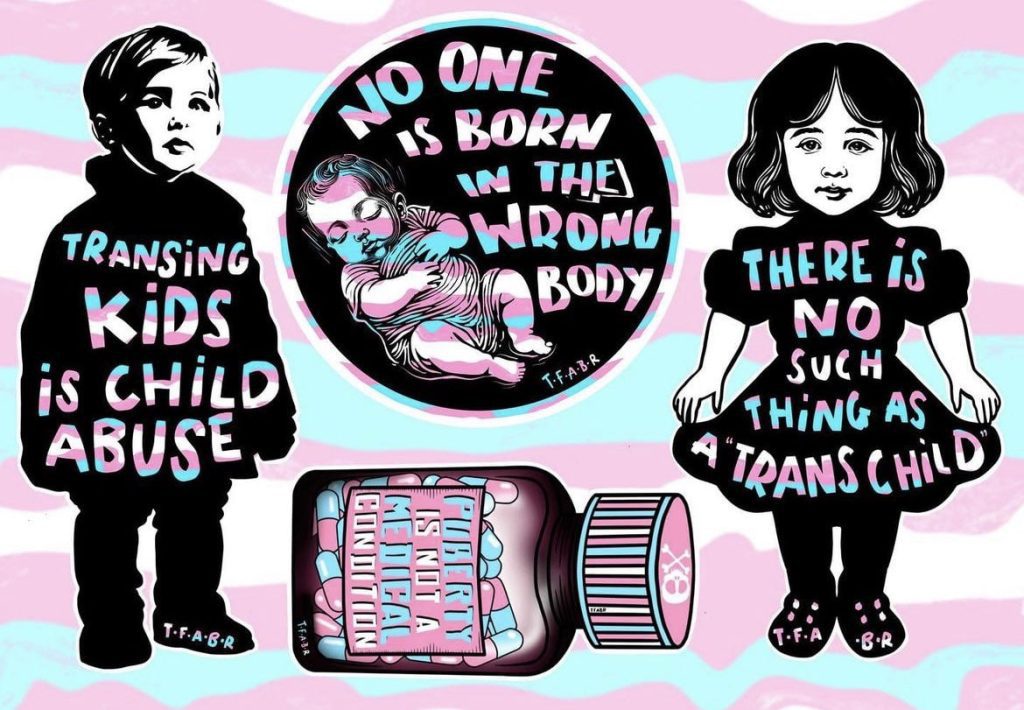Reporting on unethical practices
Last week, a controversy emerged when Norwich Library, under pressure from the local council, removed their display set up for Transgender Day of Visibility. The display, which included artwork depicting hormone replacement therapy and mastectomies, as well as a doll representing a woman with male genitalia, was criticised for promoting body alteration.
Following the removal, groups funded by left-leaning unions organized protests outside the library. James was present to report on the events.
Understanding Gender Dysphoria
Gender dysphoria is recognised as a significant psychological distress that arises from a mismatch between an individual’s gender identity and their sex assigned at birth. Treatment options may include psychological counselling, hormone therapy, and, in some cases, surgical interventions. We ask the question, has our understanding and empathy been taken advantage of by trans lobbyists and activists which has led to an increase in gender dysphoric children?
The Cass Review: Findings and Recommendations
The Cass Review, initiated by the NHS, represents a critical and comprehensive evaluation of how healthcare services for transgender youth are managed and implemented within the UK. Under the leadership of Dr. Hilary Cass, a former President of the Royal College of Paediatrics and Child Health, the review has been pivotal in identifying gaps in the current healthcare provision and suggesting reforms. Here are the detailed findings and recommendations:
- Evidence Gap: One of the main concerns highlighted by the Cass Review is the significant lack of robust, long-term evidence supporting the outcomes of medical interventions for transgender youth, particularly those that are irreversible. The review stresses the urgent need for more high-quality research to better understand the long-term impacts of these treatments on young people’s physical and psychological health.
- Cautious Approach to Treatment: The review advocates for a more conservative approach to irreversible treatments, such as hormone therapies and surgeries. Given the irreversible nature of these interventions and the developmental stages of young individuals, Dr. Cass suggests that any medical intervention should proceed with utmost caution, ensuring that the benefits clearly outweigh the risks.
- Prioritizing Psychological Support: Dr. Cass recommends prioritizing non-invasive psychological support as the primary form of intervention for gender dysphoria in young people. The review suggests that a robust system of psychological care can provide essential support while delaying more invasive treatments until the individual is older and able to make more informed decisions.
- Multidisciplinary Approach: The review calls for a multidisciplinary approach to treatment, involving specialists from various fields such as endocrinology, psychiatry, psychology, and pediatrics. This team-based approach ensures that all aspects of a young person’s health and well-being are considered in the treatment plan.
- Service Structure and Accessibility: The Cass Review also addresses the need to restructure gender identity services to improve accessibility and reduce waiting times. The proposed structure involves a regional network of services that can provide more localized support to transgender youth and their families.
- Education and Training: There is an emphasised need for better education and training for healthcare professionals working with transgender youth. This includes continuous professional development and training programs to ensure that all practitioners are up to date with the latest research and best practices in transgender healthcare.
- Engagement with Stakeholders: Finally, the review stresses the importance of involving stakeholders, including transgender youth and their families, in the ongoing development and evaluation of gender identity services. Their input is crucial in ensuring that the services provided meet the needs of those they are intended to support.
Library Materials, Ethical Concerns and Social Contaigion
The role of public libraries in educating and informing the community is universally recognized. However, there is an increasing debate over the appropriateness of children’s books that are available in these institutions, especially those depicting or celebrating medical procedures like genital surgeries and mastectomies, which are related to transgender identities and changes. Critics argue that such content could contribute to ‘social contagion,’ a phenomenon where behaviors or beliefs spread rapidly through a group influenced by social connections, media, and peer interactions. They express specific concerns regarding these books:
- Potential to Undermine Parental Guidance: Providing children access to books that deal with complex medical and ethical issues without parental oversight might bypass the rights of parents to introduce such sensitive topics in a manner they see fit. Critics worry that children exposed to these ideas without adequate context might form misconceptions or make uninformed decisions about gender that are difficult to reverse.
- Misrepresentation of Medical Realities: Books that depict medical transitions in a simplified or celebratory way risk misrepresenting the serious and irreversible nature of these procedures. Such presentations may not adequately convey the risks, long-term implications, and the considerable medical, psychological, and social considerations involved. Critics argue that children are particularly vulnerable to these portrayals because they can influence the formation of their understanding of gender and medical treatments.
- Ethical and Professional Concerns in Librarianship: The inclusion of such books in children’s sections raises profound ethical and professional questions. The central concern is whether it is appropriate for public institutions, tasked with the moral and psychological development of children, to promote content that some view as encouraging significant medical changes at a young age. This situation places libraries at the heart of a contentious debate over the balance between providing comprehensive information on all topics and protecting young patrons from potentially harmful content.
Libraries are there to help educate children, not aid in their confusion, or promote/celebrate irreversible medical procedures such as double mastectomies, sex changes, hormone replacement therapies, or phalloplasty’s. Our children deserve better and libraries should know better than to promote this to vulnerable, impressionable children.









